|
|
|
Issue Number 1 • Tuesday, Aug. 30, 2022 |
Campus ChampionPrevention Educator Marissa Whitaker M ’17 is ready to meet students where they’re at when it comes to substance use. “It’s all about balance. I’m here to help students make healthy choices around using alcohol, cannabis and other substances.” Marissa is approachable, informed, non-judgmental and welcoming. Students can find her at resource fairs, wellness events or at a private self-referral chat in the Prevention Education Office located in Van Hoesen Hall, Room B-1. And check in for a weekly discussion on the Last Call with Sarah and Marissa Podcast. Tuesday, Aug. 30Welcome Week events continue through Monday, Sept. 5: See the full list at cortland.edu/welcome-week Rec Sports Fair: Student Life Center plaza, 4 to 7 p.m. Wednesday, Aug. 31Dowd Gallery Opening Reception: “Runaway” exhibition by Beth Livensperger, Dowd Fine Arts Center, Dowd Gallery, 4 to 7:30 p.m. Read more Wellness Wednesday Intro to Africana Dance: Student Life Center, Multi-activity court, 7 to 7:30 p.m. Thursday, Sept. 1Internship and Student Employment Fair: Corey Union Exhibition Lounge, 3 to 5 p.m. Friday, Sept. 2Voice Office Welcome Party: Bishop and Shea Halls quad, 4 to 6 p.m. Dowd Gallery: First Friday, virtual and in-person event, Dowd Gallery and Facebook, Instagram, Dowd Gallery website, 5:30 to 8 p.m. Monday, Sept. 5Labor Day: No classes in session Labor Day Carnival: Neubig and Van Hoesen Hall lawn, rides and food, noon to 4 p.m. Tuesday, Sept. 6Dowd Gallery Artist’s Talk: Beth Livensperger, College of Staten Island, CUNY, for the exhibition titled “Runaway,” 4:30 p.m. online via Webex. Read more. Wednesday, Sept. 7Peer Diversity Training: Corey Union Fireplace Lounge, 4 to 6 p.m. Celebration of Life for Muteb Alqahtani: Sperry Center, Room 105, 4:30 p.m. Transfer Hang Out: Hosted by the Transfer Network Team, Randall Hall back lawn, or rain location: Student Life Center multi-activity court, 5 to 6 p.m. Wellness Wednesday Intro to the Outdoors: Student Life Center outside Outdoor Pursuits, 7 to 7:30 p.m. Thursday, Sept. 8Safe Sex Express: Corey Union steps, 2 to 3:30 p.m. Friday, Sept. 9UUP Annual Welcome/Welcome Back Picnic: Yaman Park, 4 to 7 p.m. Flyer Comedian James McCartney: Corey Union Exhibition Lounge, 7 to 8 p.m. Back to School Bash: Hosted by the Black Student Union, Corey Union Function Room, 10 p.m. to 2 a.m. Sunday, Sept. 119/11 Memorial Ceremony: City of Cortland, Courthouse Park at the 9/11 Memorial, 8:30 a.m. SUNY Cortland 9/11 Memorial Ceremony: Corey Union steps, 7 p.m. Rain location: Corey Union Function Room Tuesday, Sept. 13Greek Convocation: Old Main Brown Auditorium, 7 to 8:15 p.m. |
SUNY Cortland welcomes biggest first-year class in decades08/29/2022SUNY Cortland will welcome nearly 1,400 first-year students in Fall 2022 — the university’s largest first-year class in 33 years and a major achievement given enrollment challenges facing higher education institutions across the country. The university expects 1,384 first-year students, the most in the more than three decades first-year attendance has been tracked. More than 11,700 students applied for admission for the fall semester, which officially began Monday. “This is an extraordinary milestone,” said SUNY Cortland President Erik J. Bitterbaum. “Students and their families realize that they can receive a world-class education at an affordable cost while enjoying the unique academic, athletic and social experience this university offers. SUNY Cortland is an amazing institution with faculty, staff and alumni who truly care about our students.” Nationally, post-secondary enrollment declined 4.1% over a one-year span in 2022, according to National Student Clearinghouse data. Bitterbaum credited the efforts of the university’s Admissions Office, especially given challenges created by the COVID-19 pandemic and inflation. Among the highlights that SUNY Cortland emphasizes in student recruitment:
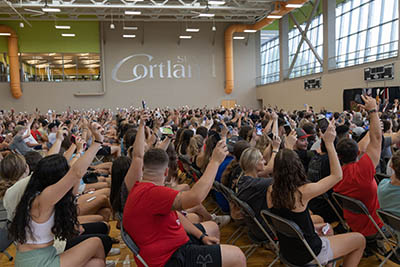
The majority of SUNY Cortland’s first-year class entering in Fall 2022 — more than 95% — comes from New York state, with 19 total states represented. The five most common New York counties represented included Suffolk, Nassau, Westchester, Onondaga and Orange. In addition to 21 former high school class presidents and 19 vice presidents, SUNY Cortland’s newest students include five valedictorians and two salutatorians. In 2021, the university placed No. 46 in the nation — the second-highest ranked SUNY comprehensive college — for service, social mobility and value, according to Washington Monthly, and recently earned recognition in the 2022 Wall Street Journal/Times Higher Education College Rankings. Cortland ranked as one of state’s best college towns09/05/2022The city of Cortland has been selected by Bestcolleges.com as one of “The Best College Towns in New York” — ranking near the top of the list at No. 5. The ranking lauds Cortland as one of the most student-friendly locales in the state. It highlights college towns with campuses generally within walking distance of housing and recreation and that are integral to their area’s culture and economy. Bestcolleges.com touts Cortland’s accessibility, where short walks and bike paths make travel easy. It also praises the variety of entertainment in the area — from picking blueberries at Cherry Knoll Farm to live shows at Cortland Repertory Theatre to the cold weather options at Greek Peak. 
Recreational and educational extras throughout the Central New York region allow the campus to elevate the student experience in ways the university could not do on its own. SUNY Cortland, meanwhile, is part of the city’s economic foundation and brings student volunteers, interns and student teachers into the community. “What makes SUNY Cortland a special place, beyond its students, faculty and staff, is the city in which it is located,” said President Erik J. Bitterbaum. “We are fortunate to live, work and study in a safe environment with wonderful neighbors. Cortland’s combination of cultural, social and natural attractions makes it a terrific place for our students to spend these formative years.” This isn’t the first time SUNY Cortland and the city have been recognized among the state or national elite. The university was found to be the safest campus in New York state in 2019 by Yourlocalsecurity.com. The website based its findings on data from the U.S. Department of Education’s Campus Safety and Security analysis and the Federal Bureau of Investigation’s Uniform Crime Reporting Program. Safewise.com also recognized Cortland in 2019, placing Cortland at No. 20 on its list of safest college towns in America — the only New York municipality that made the list. Learn more about Cortland and all the opportunities it offers on campus and in the surrounding area. Capture the MomentAssociate Professor Matthew Madden of the Physical Education Department danced with members of the men's soccer team in a procession from the Student Life Center to Park Center during Academic Convocation on Sunday, Aug. 28. Student-athletes lined the sidewalk to cheer on and encourage first-year and new students as they made their way from remarks to a dinner with faculty and staff as part of the annual opening of school tradition. In Other NewsFree Cortaca tickets available for faculty and staff bus volunteersSUNY Cortland faculty and staff members can score two free tickets and a free trip to this year’s historic Cortaca Jug game at Yankee Stadium in exchange for serving as a bus chaperone on game day. Departure from campus will take place at 7:30 a.m. on Saturday, Nov. 12, with a return from the Bronx scheduled for 30 minutes after the game ends. Buses should to arrive back in Cortland the same day at approximately 8 p.m. Volunteers will be expected to help load buses in the morning and account for all riders on the return trip to Cortland. Interested faculty and staff members should email Kevin Pristash, director of Campus Activities and Corey Union. A limited number of tickets remain available on Ticketmaster to the popular rivalry game between SUNY Cortland and Ithaca College, and the Yankee Stadium match-up is within striking distance of the Division III national attendance record. All students, faculty, staff and alumni who have not already purchased tickets are strongly encouraged to buy tickets as soon as possible due to limited inventory. A campus ticket sale took place exclusively online from Sept. 12 to 18. Charter bus tickets for students also sold out. The Cortaca Jug game set a national NCAA Division III attendance record in 2019, with 45,161 people at MetLife Stadium in New Jersey. The final attendance number for this year’s game at Yankee Stadium could exceed that milestone. “The response to this game is extraordinary,” SUNY Cortland President Erik J. Bitterbaum said. “The support and spirit shown by our students, alumni, employees and families is unlike anything else in Division III athletics.” The 63rd edition of the annual rivalry game between Cortland and Ithaca College kicks off at 1 p.m. on Saturday, Nov. 12, in the Bronx. Ithaca and Cortland are ranked 13th and 14th respectively in the D3football.com Top 25 poll through Week 4. Fans are encouraged to review the Yankee Stadium Reference Guide for information about Stadium policies and prohibited items. Additionally, fans should visit the 2022 Cortaca Jug website for more information about the historic game. President’s Opening Meeting celebrates successSUNY Cortland President Erik J. Bitterbaum stressed the importance of the university community’s ability to help individuals overcome obstacles during his Fall 2022 Opening Meeting remarks on Aug. 25. In his annual remarks to faculty and staff at the start of a new academic year, Bitterbaum noted several positive news items and encouraging trends. The incoming class of approximately 1,400 first-year students is a record high for SUNY Cortland, which received 11,700 applications for admission. The university also will welcome 500 transfer students from other institutions. “All In: Building on Success,” Cortland’s comprehensive campaign, has surpassed its goal of raising $25 million. The campaign will conclude this fall and it was designed to support five key institutional causes including support for scholarships, unique educational experiences, academic programs and faculty and nurturing SUNY’s healthiest and most athletic campus. “We as a community have a responsibility – but I think a greater joy – of educating the next generation of students that in some ways for me are very different than the students I taught 40 years ago and in other ways are very, very similar,” Bitterbaum said. Bitterbaum also lauded staff in the university’s Division of Institutional Advancement for working to raise more than $1 million for The Cortland Fund, which provides for immediate needs across campus, in each of the last three years. A Student Emergency Fund created during the COVID-19 pandemic has raised more than $475,000 to date and delivered more than 1,000 grants to students facing financial distress. The Middle States Commission on Higher Education reaffirmed SUNY Cortland’s accreditation status in June, praising the university’s faculty and staff for serving students and having a strong plan for the future. Bitterbaum also highlighted several other topics:
Bitterbaum also noted a few challenges on the horizon facing colleges and universities across the country, including student mental health, declining enrollment, financial and budget pressures and general increasingly negative general perceptions of higher education. Cortland, however, is well-positioned to handle these issues and others because of the university’s longstanding commitment to student success and fostering a community that takes pride in caring for one another. “That is the great celebration of this college,” Bitterbaum said. “First and foremost, we are a teaching institution and we do wonderful scholarship and service. But we do change students’ lives.” This point was encapsulated in a thank you note to scholarship donors from Allison McDaniel ’22 that was shared by Bitterbaum. McDaniel, an inclusive education major who had a turbulent home life as a child in Dunbar, W.Va. and dropped out of high school at age 16, came to SUNY Broome and later SUNY Cortland as a non-traditional student. She thrived given a second chance in college and wants to give back to students in her new career as a teacher in the Owego Apalachin Central School District. The support McDaniel received from faculty, staff, classmates and the donors whose scholarships made her education possible are all part of a greater Cortland community that make life-changing impacts on students. “Being a member of the SUNY Cortland student body gave me a sense of community and belonging,” McDaniel wrote. “I was surrounded by professors that truly wanted me to succeed and being in my teaching block was like gaining 50 or so sisters. We supported, encouraged and helped each other. We were a team and we only win if we walk across the stage together.” Students study ecotourism in HawaiiHawaii’s renowned beauty draws travelers from around the world. But can too many visitors spoil what made it must-see in the first place? Twenty-three SUNY Cortland students traveled more than 4,700 miles this summer to study the impact firsthand. Their July 30 to Aug. 9 trip to Hawaii was part of a SUNY Cortland ecotourism course that explored the cultural impacts and opportunities linked to ecotourism, vacation travel focused on environmental conservation and local communities. According to trip instructor Kenneth Cohen, associate professor of recreation, parks and leisure studies, the time spent experiencing authentic Hawaiian culture rather than mass tourism’s “postcard impressions” strengthened students’ passion to preserving local landscapes and cultural traditions. “The immersive experience can’t be replicated in a classroom,” Cohen said. “Standing knee-deep in water clearing invasive species side by side with local leaders who describe the intricacies of their ancient fishponds is not something students can absorb by reading.” It was a feeling shared by the students. 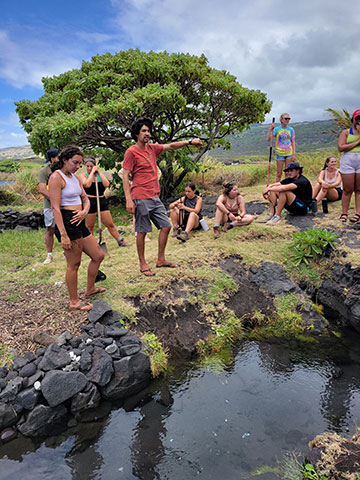
“With people I just met, we shared laughs, made the most of it, and worked as a team,” said Grace Buscemi, a senior majoring in therapeutic recreation from Wantagh, N.Y. “It was a privilege to be helping native Hawaiians and learn about their culture. I expected to be humbled by their rich culture and I definitely was; humbled in a good way, in a sense that all people are different and share different beliefs. It was quite honestly a beautiful and extraordinary experience.” According to Cohen, the goal of the course is to explore the cultural, environmental and economic impacts of ecotourism at the community level. The class focuses on Hawaii’s history and the negative impacts of mass tourism. While there, students helped on projects overseen by Hawaiian nonprofits. Declan MacDevitt, a senior sport management major from Centerport, N.Y., also praised his time in Hawaii, saying he wants to make sure he always remembers the lessons from the experience. “I came on the trip expecting to learn some new things about a new place and culture,” MacDevitt said. “But I learned so much more than I expected. I learned about the way people coexist with the land they live on. Nothing could have prepared me for what I was able to learn from this trip.” 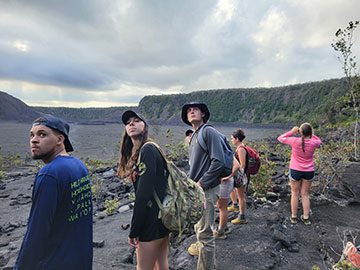
That didn’t mean everything was picture-perfect sunsets and sand. Among the projects the students helped with was removing 310 pounds of plastic from a beach. There were also online course elements, but it was a summer challenge that the students relished, according to Buscemi. “I expected some of the project work that we did there to be hard and tiring, but it was some of the best times I had in my life,” she said. She hopes to do a similar beach cleanup near her hometown on Long Island, and in Bangladesh, India, where a cousin of hers lives. It was the first time Cohen’s ecotourism class visited Hawaii. In past years, destinations have ranged from Nepal and Nicaragua to Thailand and Zanzibar. SUNY Cortland’s International Programs office, which manages the elective course, will offer Ecotourism: Tanzania next summer. Cohen views it as a unique opportunity for students to understand more of the world. “It was a long flight, and for some students this was their first time traveling far from home,” Cohen said. “In the end it was worth it. These students learned the difference between being a tourist and a traveler, and for many this is just the beginning.” SUNY Cortland leans into community actionSUNY Cortland is one of only 82 institutions of higher education in the United States recognized for action plans promoting student participation in elections by ALL IN Campus Democracy Challenge, a national, non-partisan program promoting college voter registration and turnout efforts. Cortland’s action plan for engaging students in democratic engagement, including voting, earned a Highly Established Action Plan Seal of recognition from the group, one of the largest of many organizations in the U.S. that promote college students' participation in the democratic process. Each participating campus submits a detailed action plan that describes how it will reach its voter registration and turnout goals. “This Seal recognizes SUNY Cortland’s commitment to educating and motivating civically-engaged students,” said John Suarez, director of the university’s Institute for Civic Engagement. Housed in SUNY Cortland’s Division of Academic Affairs, the Institute for Civic Engagement serves as a resource for students, faculty, staff and community partners by promoting the development of mutually-beneficial opportunities for learning through service and hands-on-experience. The Challenge considered 932 action plan participants, each of which submitted a detailed outline of how it will reach its voter registration and turnout goals. Only three other SUNY institutions made the “highly established action plan” list. 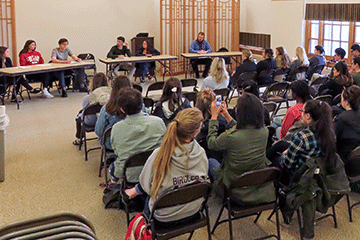 “This is not something you send in with some flip statement, ‘Yeah, this is what we’ll do and we’ll get there somehow,’” Suarez said. “They want the details. They want to know names. They want to know dates. They want to know relationships between people on a working basis. This is an action plan that takes commitment.” Cortland’s 22-page action plan includes voter registration, voter turnout and voter education activities ranging from presentations to debates to deliberative dialogues. Such dialogues are important because they help participants practice discussing divisive issues in informed, civil and productive ways. Suarez gave as an example one large upcoming event that includes a presentation, Q&A with elected officials, and a deliberative dialogue: this year’s Constitution Day event on Sept. 20, purposely scheduled on National Voter Registration Day rather than the actual Constitution Day, which falls this year on a Saturday. The Challenge was launched in 2012 when just 39% of young adults ages 18 to 29 and 47% of college students voted in the presidential election; and sharply fewer two years later in the midterm election. The National Task Force on Civic Learning and Democratic Engagement had called on the U.S. to reclaim higher education’s civic mission. “Through institutional engagement, direct student engagement, and fostering a national higher education network, ALL IN strives for an electorate that mirrors our country’s makeup and in which college students are democratically engaged on an ongoing basis, during and between elections, and not just at the polls,” according to ALL IN's website. The ALL IN Challenge doesn’t support or oppose candidates for public office or take a stand for or against any political party. Now SUNY Cortland must work to attain the highest voter registration and election turn-out rates possible by November 2024, 90% if possible, according to Suarez. Those rates were 77% and 24% in 2018 and 85% and 69% in 2020, respectively. “To get to that point, the action plan calls for an ‘all hands on deck’ effort,” Suarez said. “It involves people in offices and departments from across campus, as well as collaboration with organizations in the greater Cortland community.” Because the campus and community are collaborating on this work, ideally their partnership will lead to increased voter registration and voter turnout rates for the city and county of Cortland, including among eligible high school students, he noted. As part of the action plan, the institute will work with faculty to design nonpartisan ways of incorporating discipline-based explorations of current issues as well as concepts regarding citizenship into course syllabi. “Students need to be able to take what they are learning — along with their career dispositions like working with people you are unfamiliar with — and combine those into their work in civic decision-making actions that include not only voting but working with the city council or addressing the student senate, for example,” Suarez said. “You’re using what you’re learning not just for your career but to help guide this ship of a democratic republic,” Suarez said. “The institute, at least for the next two years, needs to have as its North Star, its guiding light, democratic engagement,” Suarez said. “It’s so reflective of SUNY Cortland’s mission statement, its strategic plan. It really needs to be part of our culture.” SUNY Cortland currently holds the prestigious community engagement elective classification from the Carnegie Foundation for the Advancement of Teaching through 2025 as both the first institution in the State University of New York system to capture this milestone in 2008 as well as the first one to hold the reclassification distinction. Dowd Gallery opens with exhibition titled “Runaway”For the last six months, SUNY Cortland’s Dowd Gallery has been cocooned from public view while, back in her studio in Queens, N.Y., Beth Livensperger worked to design a transformative art installation designed specifically for that space. Recently, during a five-day residency in Cortland, she and Dowd Gallery Assistant Scott Oldfield and Gallery Director Jaroslava Prihodova carefully installed the finished artworks. On Monday, Aug. 29, Livensperger’s “Runaway” exhibition opens to the public, kicking off Cortland’s fall semester with a visual exploration of how the fast pace of technological change has affected people’s lives. An opening reception featuring the artist from Queens, N.Y., will take place from 4 to 7:30 p.m. on Wednesday, August 31, at the gallery, located in the Dowd Fine Arts Center at the corner of Prospect Terrace and Graham Avenue. It is the first of a supporting program of in-person and virtual events in Dowd Gallery. The exhibition runs through Friday, Oct. 14. It is free and open to the public, as is the opening reception and exhibition-related events. All gallery COVID-19 restrictions have been lifted. However, visitors are advised to continue taking precautions to maintain a healthy environment for all. 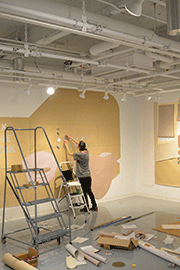 The exhibition features works that run the gamut from traditional watercolor to cut silhouettes of faux ostrich skin vinyl. “The installation at Dowd Gallery illustrates how the accelerating pace of technological change impacts social interactions, economics and personal behaviors,” said Livensperger, an assistant professor at CUNY College of Staten Island’s Department of Performing and Creative Arts. “Large-scale collages and cutouts directly applied to the gallery walls point to these impacts, including our winner-take-all economy, disadvantaged ZIP codes and corrosive disinformation exacerbated by digital interventions.” “From Uber to WeWork and Airbnb, new app-based employers warp traditional labor conditions, making it ever harder for workers to build autonomy and reliable working conditions.” Livensperger earned art degrees from The Cooper Union and Yale University. Her previous projects have explored ideas related to feedback loops between humans and institutions such as courts, museums and schools. 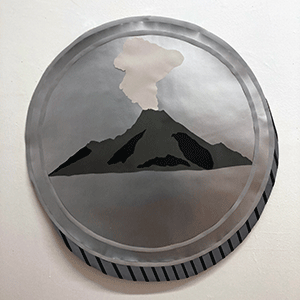 She started creating “Runaway” in Dowd Gallery in March, and it has been the longest gestation period of any exhibition she has ever worked on. “My ideas and formal strategies evolved during and due to the making process,” she said. “Because the installation is a web of interconnected pieces, some of which function as one and some of which stand alone, I was able to more or less fluidly respond to revisions in my thought.” “Runaway” additionally highlights surveillance technologies and their contribution to class inequality and environmental politics. Livensperger noted that surveillance runs the gamut from facial recognition to online tracking and data extraction. According to her, while not denying the numerous positive impacts of current technology, this project highlights rising collective anxiety over its attendant downsides. This body of work reflects the difficulties and possibilities inherent in our relationship to structures of power. “The past two years have taught us that our interconnectivity and on-demand production also increase systemic fragility,” Livensperger said. In addition to the feature exhibition, the Dowd Gallery will present a supporting program including an artist’s talk, documentary screenings, a workshop and lectures that place the artwork in a wider perspective. All programs are open to students and the public free of charge. Events related to the exhibition are scheduled to take place in person at Dowd Gallery unless noted otherwise:
Gallery hours are 10 a.m. to 5:30 p.m. Monday, Tuesday, Wednesday and Friday and 10 a.m. to 7 p.m. Thursday or by appointment. “Runaway” is partially funded by the Pollock-Krasner Foundation and the Provost’s Research Fellowship at the College of Staten Island, CUNY. SUNY Cortland support includes the Art and Art History Department, Art Exhibition Association, Cortland Auxiliary Services grant, Campus Artist and Lecture Series, Communication and Media Studies Department, Cultural and Intellectual Climate Committee, School of Arts and Sciences Dean’s Office, Economics Department, Institutional Equity and Inclusion Office, Haines Fund, President’s Office, Provost and Vice President for Academic Affairs’ Office, Student Government Association. Visit the Dowd Gallery website for details about exhibiting artists, other programs, safety protocols and online booking. For more information or to inquire about an appointment, tour or additional images, contact Jaroslava Prihodova, Dowd Gallery director, at 607-753-4216. Celebration of life for Muteb AlqahtaniSUNY Cortland’s School of Education will hold a celebration of life ceremony for Dr. Muteb Alqahtani at 4:30 p.m. on Wednesday, Sept. 7 in Sperry Center, Room 105. The event will include video remembrances from students, invited tributes and a message from one of Alqahtani’s mentors, Dr. Arthur B. Powell, associate professor of mathematics education at Rutgers University. Assistant Professor Jeremy Jimenez will serve as master of ceremonies. Members of the campus community should be aware that a Muteb Alqahtani Memorial fund has been created to honor his generous spirit and support students in need. Community roundtable to promote Democratic engagementWays to encourage Cortland County folks to become more involved in their democracy on a local level will be discussed at a Community Roundtable on Thursday, Oct. 6, at SUNY Cortland. The in-person program, titled “Getting Cortland County More Democratically Engaged,” will feature a panel discussion with local civic leaders. Panelists will describe the challenges, actions and benefits of projects that they and others are developing to increase people’s democratic engagement — their voices — in Cortland County decision-making. Panelists will include:
“Low rates of voter registration and citizen engagement in government decision-making are hurting our community,” said Suarez, who also coordinates the university’s Office of Service-Learning and is co-managing editor of The Journal of the Scholarship of Engagement. “To help bring more voices into civic decision-making, people in education, government, nonprofits and business are working to provide opportunities for people to become more involved,” he said. The roundtable will take place from 8 to 9 a.m. in the Park Center Hall of Fame Room. Refreshments will be served at 7:45 a.m. The Community Roundtable series provides programs on diverse intellectual, regional and cultural topics of interest to College faculty and staff and community members. Sponsored by the President’s Office, the Community Roundtable is free and open to the public. Registration is not required. Parking in the Park Center lot is open to the public during the roundtables. To request accommodations, contact Special Events for the President at 607-753-5453. For more information, contact John Suarez. SUNY Cortland deploys a new type of energy hogIt’s not hogwash. SUNY Cortland is using pigs to clean up unruly grass and weeds around its solar panels. It’s a first-of-its-kind experiment to see whether a special breed of grazing pig can someday replace gas guzzling machines in difficult-to-mow locations. SUNY Cortland already uses a small herd of sheep to crop the grass under and around its solar array. Visitors can see the two new Kunekune pigs (pronounced “cooney cooney”) grazing with the sheep at the university’s fenced field of solar panels near Route 281. “As these would be the first solar grazed pigs in the country, we are looking to make history once again,” Scott said. It would also make the Kunekune quite a particular type of pig. When it comes to solar grazers, most animals are more trouble than their appetites are worth. According to Scott, larger livestock are too big, and goats chew on wires and jump where they shouldn’t. Other pig breeds are too destructive when they root up the ground. The Kunekune breed doesn’t act like other pigs. In their native country they’re known for grazing alongside sheep — and they do not challenge fences. They also have short, upturned snouts that discourage rooting. If those behaviors hold true while they graze at the university, Kunekune pigs may soon expand the options available for grazing at other solar facilities. Daniel Dryja, director of facilities operations and services, has overseen the pigs since late July after they were brought to SUNY Cortland. 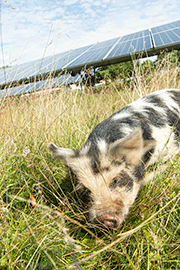 “We’ve had a very good experience working with Highland Grazing Ranch,” he said. “They are a very professional, knowledgeable, and personable group of individuals. When they approached the college with the idea of utilizing pigs along with the sheep, I thought it was a great idea. Obviously, we strive to be as sustainable as possible in our endeavors on campus, and if we can help with some experimentation along the way, even better.” So far, the test has been a success. There have been no unexpected problems and Scott says the pigs have been happy to clean up whatever grazing plants the sheep leave behind. If the pigs successfully pasture at the university for a month, Scott plans to bring a larger herd of pigs back next spring. “SUNY Cortland has been absolutely fantastic. They are incredibly forward-thinking when it comes to sustainability and the dual use of solar,” Scott said. “Daniel and the maintenance department have been fantastic assisting with watering and water availability. And the animals enjoy the attention of all the passersby.” It’s a willingness to innovate that’s helped make Cortland one of the top green colleges in the country. Its solar array uses 2,443 panels to produce 1,118 Kilowatts of electricity, and the campus itself uses 100% renewable electricity through solar power and the purchase of other renewable energy. Now, through the use of Kunekune pigs, the university is leading the way on new methods of solar power maintenance that could have impact far beyond campus. To learn more about all SUNY Cortland does — pigs and otherwise — for the environment, read about university’s efforts to ensure sustainability. Cortland College-Community Orchestra names conductorSUNY Cortland’s Performing Arts Department has named Max Buckholtz as the new conductor for the Cortland College-Community Orchestra, which is now recruiting members for the 2022-23 academic year. Currently employed in Cornell University’s Performance and Media Arts Department, Buckholtz replaces Ubaldo Valli, who had served in the role since 2009. “We are thrilled to have Max join as the College-Community Orchestra director,” said Deena Conley, department chair. “We are excited about the new music he’s going to bring to the community.” 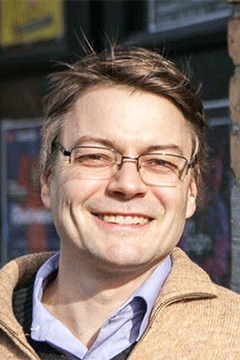 Buckholtz, who earned a Master of Music in Violin Performance from Ithaca College, has more than 30 years of teaching experience, from 4-year-old children through the college level. Since 2011, Buckholtz has directed Journey West residencies, a three-violin ensemble with Arabic, Turkish and Western tuning that offers lectures, performances and workshops tracing music of the Near East to the U.S. Since 2001, Buckholtz has performed as principal violinist with the Orchestra of the Southern Finger Lakes. He served Wells College as both orchestra and jazz band director for a year during the regular instructor’s sabbatical. Through Relief International, in 2018 Buckholtz performed therapeutic music to Syrian refugee children at the Al’Azraq camp in Jordan. He has studied many traditional music styles and his musical outreach has taken him across the U.S. and as far away as Jordan, Belgium, Italy, Holland and Romania. The Cortland College-Community Orchestra is open to all qualified musicians from at least age 14 who are available to rehearse through the university semester on Monday nights from 7 to 9 p.m. at Rose Hall, 19 Church St. in Cortland. Student transportation will be provided. The ensemble comprises a variety of people and, as student members continually leave after graduation, opportunities exist for new members. The Cortland College-Community Orchestra’s first concert is set for Tuesday, Nov. 29. An organizational meeting will take place at 7 p.m. on Wednesday, Sept. 7, in Dowd Fine Arts Center, Room 242. SUNY Cortland students, faculty members or Cortland area community members who wish to join should contact Buckholtz or the university’s Performing Arts Department. Stock image by Pexels from Pixabay 988 is new mental health hotlineA new phone number is making mental health services easier to access, both across the nation and at SUNY Cortland. Anyone who calls or texts 988 will now be answered by the 988 Suicide & Crisis Lifeline. It’s a national effort to help anyone experiencing mental health-related distress — whether that is thoughts of suicide, mental health or substance use crisis, or other kinds of emotional distress. People can also dial 988 if they are worried about a loved one who may need support. It’s a change that Emily Quinlan, assistant director of Care and Outreach Services, says will help alongside SUNY Cortland’s own dedicated efforts to promote mental well-being. “Similarly to physical health issues, mental health affects our daily lives and needs to be taken seriously,” Quinlan said. “While mental health symptoms are often invisible, they are just as impactful. It can be frustrating and demoralizing when individuals are trying their best to address their mental health needs and they still feel unsupported.” Quinlan noted that students can also call 607-753-4728 to reach the university Counseling Center, which provides free and confidential short-term therapeutic services. “There are numerous resources on campus that can be utilized to help support mental health,” Quinlan said. “Our University Police are often first responders when there is a mental health crisis and they do a phenomenal job assisting students.” The national mental health hotline began in 2005 as the National Suicide Prevention Lifeline, using the number 1-800-273-TALK. Since then, it has taken more than 23 million calls, with 2.4 million in 2020 alone. While the old phone number is still usable, the easier- to- dial 988 will be the focus from now on. The change is designed to make mental health services convenient, quick and dependable to anyone who needs it. Before the switch to 988, the longer phone number used by the Lifeline would sometimes be ignored in favor of general emergency number 911. Not only did this overburden the 911 system, but the response to mental health calls would often come from police or emergency health services instead of trained crisis counselors. 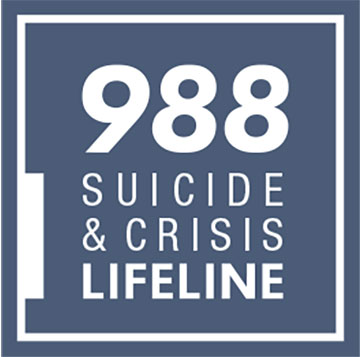
Individuals who contact the number will be helped by trained mental health professionals at one of more than 180 local crisis centers around the country. For those who don’t feel like talking by phone, there is an online chat option at 988lifeline.org/chat. The counselors available through the 988 number can assess and de-escalate a crisis and connect callers to appropriate services. If needed, they will still route calls to law enforcement when an incident needs more than a behavioral health response. According to 988lifeline.org, only 2% of Lifeline calls in New York State in 2020 resulted in emergency medical services being dispatched to the caller, reducing the crunch on emergency resources. Most callers also reported significant relief from psychological pain, hopelessness and anxiety. Yet despite the available help, the elusive nature of mental health is what can make treatment difficult. Quinlan says that being proactive can make a big difference. “Asking someone if they are suicidal does not put the thought in their head. It is OK to ask if you are concerned about someone. Never hesitate to call for help.” To learn more about SUNY Cortland’s available mental health services, visit the website. Alum named New York’s history teacher of the yearCaitlin Goodwin ’11, M ’16 has been named the 2022 New York State History Teacher of the year by the Gilder Lehrman Institute of American History, the nation’s leading organization dedicated to K-12 American history education. Goodwin, a social studies teacher at McGraw Jr. Sr. High School in McGraw, N.Y., is now one of 53 finalists for the 2022 National History Teacher of the Year Award, to be announced in October. Past presenters of that award include former U.S. Supreme Court Justice Sandra Day O’Connor, Good Morning America’s Robin Roberts, former First Lady Laura Bush, former U.S. Secretary of Education Arne Duncan and former New York City Mayor Michael Bloomberg. “Ms. Goodwin has always demonstrated a love of history and passion for teaching our students at McGraw,” said one of Goodwin’s award nominators, Mark Dimorier, principal of McGraw Jr. Sr. High School, where Goodwin has taught seventh and eighth graders for 11 years. “Whether she is bringing students to Washington D.C. or France or just bringing them outside to reenact the Battle of Bunker Hill in the snow, she is enthusiastic, innovative and gets kids excited to learn, in and out of the classroom.” Goodwin has kept close ties to SUNY Cortland's History Department, where she earned both her B.A. and M.S.Ed. degrees in adolescence education and history. She currently is enrolled in the Educational Leadership program of the university’s School of Education for a certificate of advanced studies (C.A.S.). The sample lesson plan Goodwin submitted with her application to the Gilder Lehrman Institute originated with an undergraduate paper she wrote for a course she took under SUNY Cortland History Professor Randi Storch. It explored the New York Central College, America’s first racially and sexually integrated college, which operated from 1849 to 1860 on land now occupied by McGraw’s high school. Since then, Goodwin has worked closely with the McGraw Historical Society to develop an ever more engaging classroom experience. Goodwin’s class spends almost five days studying aspects of the college’s historical significance, including the geography that placed it in this unique location and central and western New York’s history of religious revivals and new religious and progressive movements In the mid-19th century. That Included the movement to abolish slavery in the U.S., notably led by Gerrit Smith of Peterboro, N.Y., the college’s founder. Started by Smith and other abolitionists before the Civil War the New York Central College not only modeled the racially integrated and co-educational college classroom that produced some noteworthy Americans, including Mary Edmonia Lewis, the first African American and Native American sculptor to achieve international recognition. “The New York Central College is not only notable in our area, but has national connotations to very famous people and social movements,” Goodwin said. “It was the first college in the nation to have Black professors teaching white students, too.” “I chose this lesson plan in particular to share with Gilder Lehrman because it’s something for kids to be proud of, especially in a small, rural district like McGraw,” Goodwin said. “You have students who don’t feel any kind of pride in their community. I think that’s a really big part of citizenship. It’s important to know and for kids to work with these primary sources just a five minute walk from school.” Goodwin aims to show her students both the beauty of exploring their own community’s past and how they can be better citizens in the future by looking critically at conflicting or potentially misleading or inaccurate information. “I really just view teaching as a chance to prepare a well-rounded group who knows about their country, and the world, who understand what it means to be a good American or a good global citizen,” she said of her students. “They’re the best. At that age, they are still so excited to learn,” said Goodwin of teaching the 12 and 13-year-olds for whom she strives every day to bring history alive while she coordinates speakers, special events and local and national field trips on the side. “I. Laugh. Every. Day. I love it,” she said. Goodwin thanks SUNY Cortland educators for preparing her to model social studies teaching across New York state. “They do everything right here,” Goodwin said. “From someone who’s done professional development all around the country, I can’t imagine getting a better education in the scholarship of teaching history and in history itself than here, from these professors.” Her professional growth included participation in the ‘Forever Wild’ weeklong immersive experience for K-12 educators that reveals the historical importance of the Adirondack wilderness during the Gilded Age and Progressive Era. SUNY Cortland History Department Professor and Chair Kevin Sheets and Storch run the program, supported by the National Endowment for the Humanities (NEH). It is held, in part, at the university’s William H. Parks Family Center for Environmental and Outdoor Education in Raquette Lake, N.Y Goodwin’s learning journey continues at summer’s end, when she departs for Germany among a SUNY Cortland student and alumni cohort led by Associate History Professor Gigi Peterson. They will participate in a Universität Potsdam Summer School, “Teaching the SDGs,” that is, the United Nations Sustainable Development Goals, and “Engaging in Global Citizenship.” Afterward, Goodwin and a second alumni educator, Taylor Weigand ’10 of Binghamton (N.Y.) High School, will continue to collaborate as alumni-teacher associates on the international learning community project with Peterson and the Adolescence Education Social Studies Program. A member of the Central New York Council for Social Studies, Goodwin has engaged in myriad national and international programs and professional development opportunities, including the Albert H. Small Normandy Institute, in which she and a student traveled to France to study the D-Day campaign. A Ford’s Theatre Master National Oratory Fellow, she was recognized as a Lincoln Teacher Leader. COVID-19 Safety Information page updatesDear campus community, I want to let you know that the university has made some important updates to the COVID-19 Safety Information page in advance of the 2022-23 academic year. Policies to note include:
Additional information for students and employees is available on the COVID-19 Safety Information page. This page will be continuously updated, and any future policy changes will also be communicated by email. The university will work with partners from the state Department of Health, the State University of New York and the Cortland County Health Department to monitor the situation and adapt to new circumstances. Thank you for your attention and for doing your part to keep SUNY Cortland safe. Have a wonderful summer break. All the best, Erik J. Bitterbaum President Welcome at the start of a new academic yearDear students, I want to wish you a warm welcome at the start of a new academic year at SUNY Cortland. This is an exciting time for you to get settled in new classes, participate in many activities and make lifelong friends. I hope that you find your academic work to be stimulating, engaging and helpful in preparing you for a career after graduation. Please make the most of your time with our wonderful faculty and the expertise they have to share. If you do have any concerns with your academics, please reach out to faculty and meet with them during office hours. Also know that offices such as Advisement and Transition, Memorial Library, The Learning Center and the Writing Center are here to assist you. Outside of your classes, I encourage you to take part in the many athletic, cultural and social events that take place on campus throughout the semester. Joining a club, playing intramural sports or attending a lecture or concert are great ways to manage your stress and connect with classmates. The events calendar on Cortland Connect lists many upcoming opportunities. Finally, I ask that you take your responsibilities to the Cortland community seriously. We are fortunate to have such a talented and diverse group of students, faculty, staff and neighbors in the city living and working together. Cortland will always be a special place if we continue to treat one another with kindness, dignity and respect. All the best, Erik J. Bitterbaum President Welcome Week continues through Sept. 5SUNY Cortland’s Welcome Week continues through Monday, Sept. 5 with many fun and informative events for students. More information and a full schedule of events is available online from Campus Activities. Tuesday, Aug. 30
Wednesday, Aug. 31
Thursday, Sept. 1
Friday, Sept. 2
Saturday, Sept. 3
Sunday, Sept. 4
Monday, Sept. 5
CALS Lecture Grant applications due Sept. 8Campus Artist and Lecture Series (CALS) Lecture Grant applications are now available for the 2022-2023 academic year. Applications are available online and are eligible for a maximum of $350. They are open to any club, program or department. These lecture grants will not cover performances of any kind. Applications must be received by Thursday, Sept. 8 to be considered for September, October, November and/or December 2022 lecture programs. Applications received after Sept. 8 may not be eligible for any fall semester funds remaining. For more information and to download this application, visit the CALS website or contact Sandra Wohlleber by email or at 607-753-5769.  Suggest a feature story Suggest a feature story
People on the MoveTommy Prairie named Cortland wrestling head coachTommy Prairie has been named the wrestling head coach at SUNY Cortland, according to director of athletics Mike Urtz. He replaces Brad Bruhn, who stepped down from the position after a 20-year career with the Red Dragons. Prairie comes to Cortland after most recently serving as head coach at Washington & Jefferson College in Pennsylvania for 11 years from 2011-22. "We're excited for this opportunity to have Tommy on board for our wrestling program," noted Urtz. "His experience in the sport will lend itself in keeping Cortland wrestling on the map nationally. It's a mutually positive opportunity for both Coach Prairie and Cortland Athletics." Prairie served as head coach at Plymouth State University in New Hampshire from 2007-11. He coached 19 wrestlers who placed at the New England Wrestling Association (NEWA) Championships, the NCAA qualifying meet, and had five NWCA Scholar All-Americans. Prairie was named the 2008 NEWA Rookie Coach of the Year, was selected to the National Wrestling Leadership Academy in 2009, and helped the Panthers finish fourth at the 2011 NEWA Championships for their best finish since 2003. A native of Delran, N.J., Prairie was a standout wrestler at Williams College in Massachusetts, where he graduated in 2005 with a bachelor’s degree in economics and political science. He was a three-time All-American at 125 pounds, including a national runner-up finish in 2005, a third-place showing in 2003 and a fourth-place finish in 2004. Prairie compiled an overall collegiate record of 106-8, was a three-time NEWA champion, earned the South Jersey College Wrestler of the Year award in 2005, and was inducted into the New England Wrestling Hall of Fame in 2010. Prairie earned a master’s degree from Cumberland University in Tennessee in 2006 and served as a graduate assistant coach at the school during the 2005-06 season. A 2001 graduate of Blair Academy in Blairstown, N.J., Prairie was a high school All-American and a national prep All-American as a member of the nation's top-ranked high school team. He also attended Delran High School before spending one year at Blair Academy. He was a state place winner and two-time state qualifier at Delran and was inducted into the school's Athletic Hall of Fame in 2013. Prairie and his wife, Jessica, have a son, Chase. Faculty/Staff ActivitiesBrittany AdamsBrittany Adams, Literacy Department, had an article, “Himpathy, Herasure, and Down Girl Moves: A Critical Content Analysis of Sexual Assault in Young Adult Literature,” published Aug. 1 in Journal of Literacy Research. Alexandru BalasAlexandru Balas, Clark Center for Global Engagement and International Studies Program, had his latest book, Sharing the Burden of Peace. Inter-Organizational Cooperation in Peace Operations, published by Peter Lang. Alexis BlavosAlexis Blavos, Health Department, and colleagues had an article titled “Politics Spread COVID: Developing a Public Health Response” published in August in Health Promotion Practice. Tyler BradwayTyler Bradway, English Department, had his book Queer Kinship: Race, Sex, Belonging, Form published on Aug.19 by Duke University Press. He co-edited the book with Elizabeth Freeman from University of California, Davis and it appears in Duke’s Theory Q series, which is devoted to critical sexuality studies. The Lambda Literary Foundation listed Queer Kinship on its “August’s Most Anticipated LGBTQIA+ Literature” list. Kevin DamesKevin Dames, Kinesiology Department, and Sutton Richmond, University of Florida, presented their project at the World Congress of the International Society of Posture and Gait Research, held July 3 to 7 in Montreal. The study, “Characterizing Trial Duration in Single and Multi-Dimensional Postural Control Measures” establishes minimum trial durations necessary to acquire reliable force platform-derived outcomes. Recommendations from this project can improve consistency in collecting balance data for future studies and enhance confidence in clinical assessments of sensorimotor function.
Abigail DrogeAbigail Droge, English Department, co-authored “What Everyone Says: Public Perceptions of the Humanities in the Media” with Alan Liu, Scott Kleinman, Lindsay Thomas, Dan C. Baciu and Jeremy Douglass, which was published in Daedalus in Summer 2022. Evan FaulkenburyEvan Faulkenbury, History Department, had an article published in the peer-reviewed journal The Public Historian, considered the definitive voice of the public history profession. The article is titled “Howard Zinn’s Public History.” Jeremy JimenezJeremy Jimenez, Foundations and Social Advocacy Department, presented a paper titled “Portrayal of Religion Against the Backdrop of Progress and Modernity in the US and Canadian Social Science Textbooks from 1850 to 2010” at the Future of World Society conference at Pomona College, Los Angeles. Caroline K. KaltefleiterCaroline K. Kaltefleiter, Communication and Media Studies Department, presented a paper titled “Prefiguration and (COVID) Care: Anarcha-Feminism, Trebled Reflexivity, and Mutual Aid” on Aug. 24 at the 7th Anarchist Studies Network International Conference, held virtually. Also, she participated in a plenary session on the “Future of Anarchist Studies.” Christina KnopfChristina Knopf, Communication and Media Studies Department, presented at two conferences in late July. She participated in a panel discussion, “Comics on Campus: Fandom + Academia,” in the educational track of the San Diego Comic Con-International on July 23. Also, she presented a co-authored paper, “Letters and Lace: Male Call and its Readers,” with Dr. Daniel Yezbick, St. Louis Community College, Wildwood, at the annual convention of the Comics Studies Society held July 29 at Michigan State University. Earlier in the summer, it was announced that Dr. Knopf is now a co-editor of the Routledge Advances in Comics Studies book series.  Submit your faculty/staff activity Submit your faculty/staff activity
|
The Bulletin is produced by the Communications Office at SUNY Cortland and is published every other Tuesday during the academic year. Read more about The Bulletin. To submit items, email your information to [email protected]
© 2026 SUNY Cortland. All rights reserved.
